Examining Conformity, Obedience, Identification, and Social Loafing
VerifiedAdded on 2023/06/13
|9
|2611
|326
Essay
AI Summary
This essay explores key psychological concepts including conformity, obedience to authority, identification, and social loafing. Conformity is defined as adjusting behavior or beliefs to fit in with a group, influenced by factors like group cohesion and size. Obedience involves acting in response to an authority figure's orders, supported by Milgram's Agency theory, which differentiates between autonomous and agentic states. Identification is a psychological process where an individual adopts attributes of others. Social loafing refers to the tendency to exert less effort in a group setting, impacting team dynamics, especially relevant in contexts like police training. The essay references experiments and theories, such as Asch's conformity experiments and Merton's Strain Theory, to illustrate these concepts and their implications for individual and group behavior. Find more solved assignments on Desklib.

PSYCHOLOGY CONCEPT
Paraphrase This Document
Need a fresh take? Get an instant paraphrase of this document with our AI Paraphraser
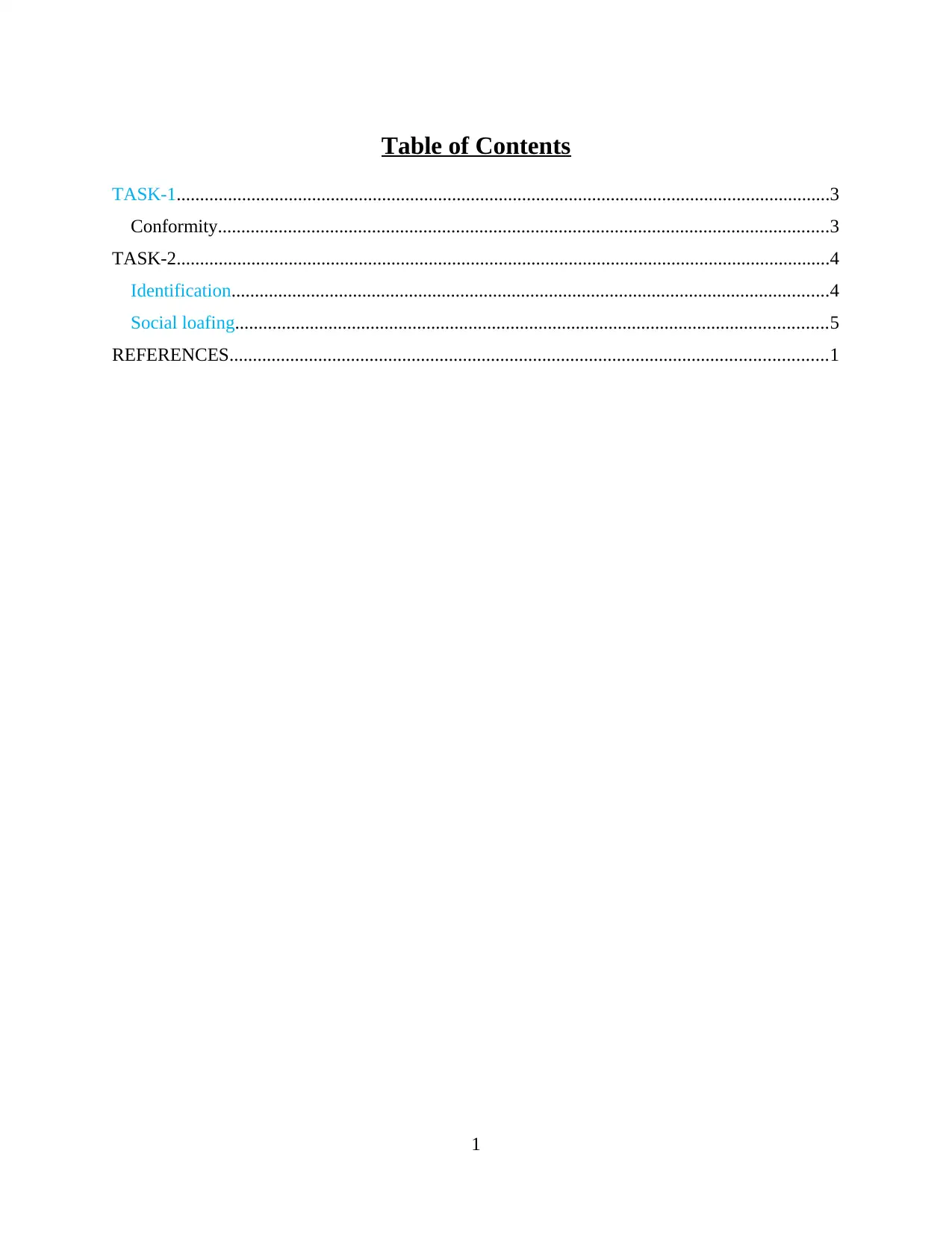
Table of Contents
TASK-1............................................................................................................................................3
Conformity...................................................................................................................................3
TASK-2............................................................................................................................................4
Identification................................................................................................................................4
Social loafing...............................................................................................................................5
REFERENCES................................................................................................................................1
1
TASK-1............................................................................................................................................3
Conformity...................................................................................................................................3
TASK-2............................................................................................................................................4
Identification................................................................................................................................4
Social loafing...............................................................................................................................5
REFERENCES................................................................................................................................1
1
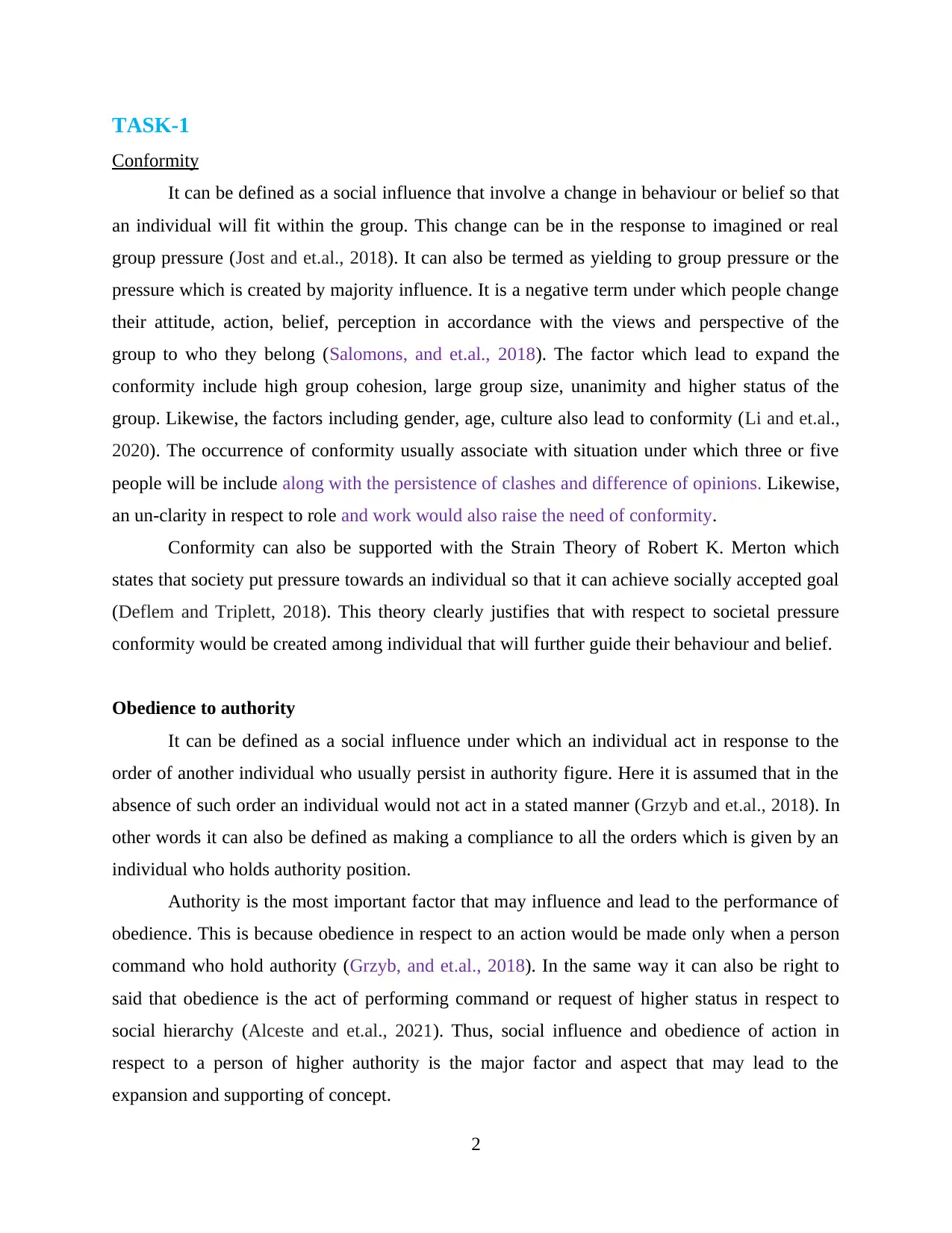
TASK-1
Conformity
It can be defined as a social influence that involve a change in behaviour or belief so that
an individual will fit within the group. This change can be in the response to imagined or real
group pressure (Jost and et.al., 2018). It can also be termed as yielding to group pressure or the
pressure which is created by majority influence. It is a negative term under which people change
their attitude, action, belief, perception in accordance with the views and perspective of the
group to who they belong (Salomons, and et.al., 2018). The factor which lead to expand the
conformity include high group cohesion, large group size, unanimity and higher status of the
group. Likewise, the factors including gender, age, culture also lead to conformity (Li and et.al.,
2020). The occurrence of conformity usually associate with situation under which three or five
people will be include along with the persistence of clashes and difference of opinions. Likewise,
an un-clarity in respect to role and work would also raise the need of conformity.
Conformity can also be supported with the Strain Theory of Robert K. Merton which
states that society put pressure towards an individual so that it can achieve socially accepted goal
(Deflem and Triplett, 2018). This theory clearly justifies that with respect to societal pressure
conformity would be created among individual that will further guide their behaviour and belief.
Obedience to authority
It can be defined as a social influence under which an individual act in response to the
order of another individual who usually persist in authority figure. Here it is assumed that in the
absence of such order an individual would not act in a stated manner (Grzyb and et.al., 2018). In
other words it can also be defined as making a compliance to all the orders which is given by an
individual who holds authority position.
Authority is the most important factor that may influence and lead to the performance of
obedience. This is because obedience in respect to an action would be made only when a person
command who hold authority (Grzyb, and et.al., 2018). In the same way it can also be right to
said that obedience is the act of performing command or request of higher status in respect to
social hierarchy (Alceste and et.al., 2021). Thus, social influence and obedience of action in
respect to a person of higher authority is the major factor and aspect that may lead to the
expansion and supporting of concept.
2
Conformity
It can be defined as a social influence that involve a change in behaviour or belief so that
an individual will fit within the group. This change can be in the response to imagined or real
group pressure (Jost and et.al., 2018). It can also be termed as yielding to group pressure or the
pressure which is created by majority influence. It is a negative term under which people change
their attitude, action, belief, perception in accordance with the views and perspective of the
group to who they belong (Salomons, and et.al., 2018). The factor which lead to expand the
conformity include high group cohesion, large group size, unanimity and higher status of the
group. Likewise, the factors including gender, age, culture also lead to conformity (Li and et.al.,
2020). The occurrence of conformity usually associate with situation under which three or five
people will be include along with the persistence of clashes and difference of opinions. Likewise,
an un-clarity in respect to role and work would also raise the need of conformity.
Conformity can also be supported with the Strain Theory of Robert K. Merton which
states that society put pressure towards an individual so that it can achieve socially accepted goal
(Deflem and Triplett, 2018). This theory clearly justifies that with respect to societal pressure
conformity would be created among individual that will further guide their behaviour and belief.
Obedience to authority
It can be defined as a social influence under which an individual act in response to the
order of another individual who usually persist in authority figure. Here it is assumed that in the
absence of such order an individual would not act in a stated manner (Grzyb and et.al., 2018). In
other words it can also be defined as making a compliance to all the orders which is given by an
individual who holds authority position.
Authority is the most important factor that may influence and lead to the performance of
obedience. This is because obedience in respect to an action would be made only when a person
command who hold authority (Grzyb, and et.al., 2018). In the same way it can also be right to
said that obedience is the act of performing command or request of higher status in respect to
social hierarchy (Alceste and et.al., 2021). Thus, social influence and obedience of action in
respect to a person of higher authority is the major factor and aspect that may lead to the
expansion and supporting of concept.
2
⊘ This is a preview!⊘
Do you want full access?
Subscribe today to unlock all pages.

Trusted by 1+ million students worldwide
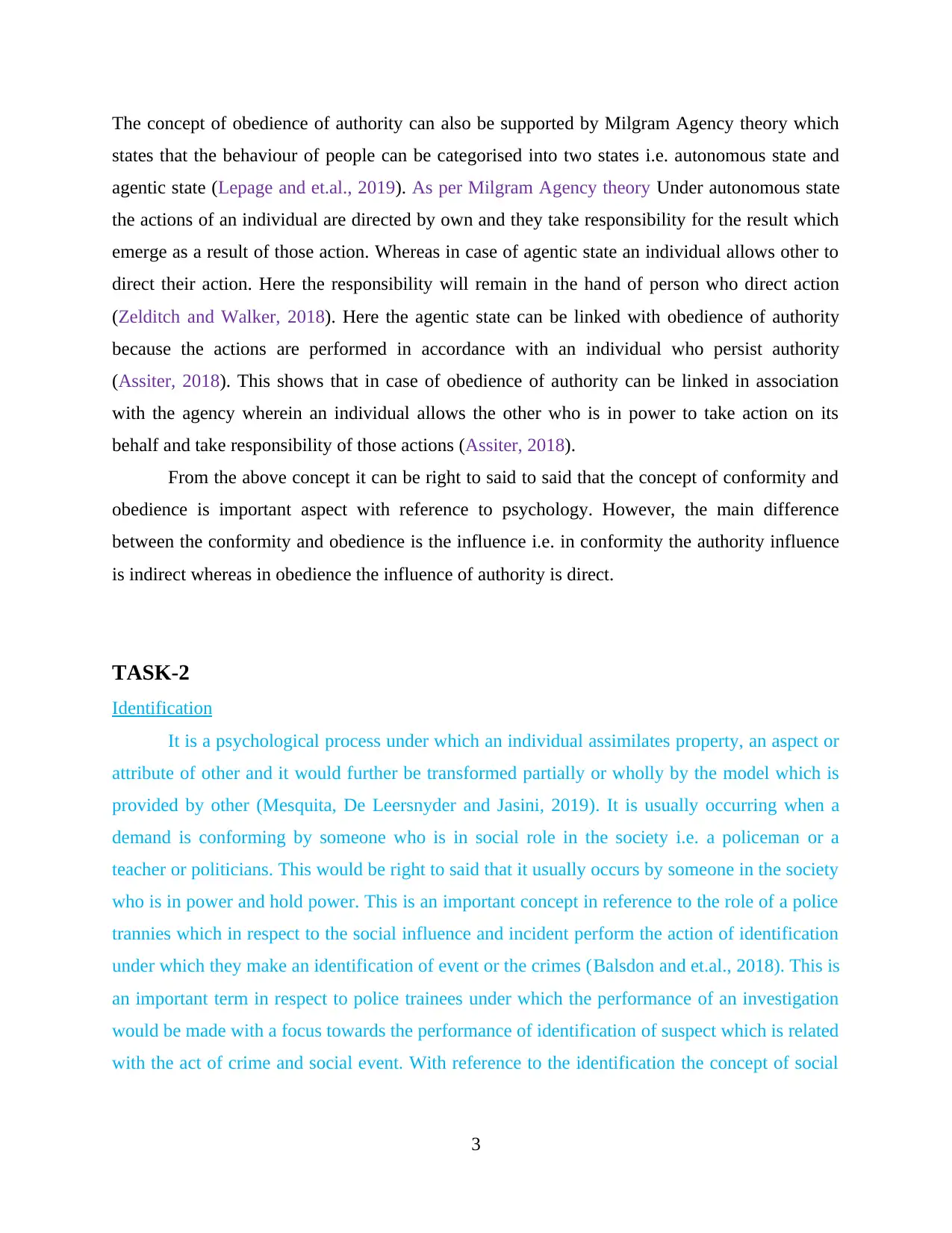
The concept of obedience of authority can also be supported by Milgram Agency theory which
states that the behaviour of people can be categorised into two states i.e. autonomous state and
agentic state (Lepage and et.al., 2019). As per Milgram Agency theory Under autonomous state
the actions of an individual are directed by own and they take responsibility for the result which
emerge as a result of those action. Whereas in case of agentic state an individual allows other to
direct their action. Here the responsibility will remain in the hand of person who direct action
(Zelditch and Walker, 2018). Here the agentic state can be linked with obedience of authority
because the actions are performed in accordance with an individual who persist authority
(Assiter, 2018). This shows that in case of obedience of authority can be linked in association
with the agency wherein an individual allows the other who is in power to take action on its
behalf and take responsibility of those actions (Assiter, 2018).
From the above concept it can be right to said to said that the concept of conformity and
obedience is important aspect with reference to psychology. However, the main difference
between the conformity and obedience is the influence i.e. in conformity the authority influence
is indirect whereas in obedience the influence of authority is direct.
TASK-2
Identification
It is a psychological process under which an individual assimilates property, an aspect or
attribute of other and it would further be transformed partially or wholly by the model which is
provided by other (Mesquita, De Leersnyder and Jasini, 2019). It is usually occurring when a
demand is conforming by someone who is in social role in the society i.e. a policeman or a
teacher or politicians. This would be right to said that it usually occurs by someone in the society
who is in power and hold power. This is an important concept in reference to the role of a police
trannies which in respect to the social influence and incident perform the action of identification
under which they make an identification of event or the crimes (Balsdon and et.al., 2018). This is
an important term in respect to police trainees under which the performance of an investigation
would be made with a focus towards the performance of identification of suspect which is related
with the act of crime and social event. With reference to the identification the concept of social
3
states that the behaviour of people can be categorised into two states i.e. autonomous state and
agentic state (Lepage and et.al., 2019). As per Milgram Agency theory Under autonomous state
the actions of an individual are directed by own and they take responsibility for the result which
emerge as a result of those action. Whereas in case of agentic state an individual allows other to
direct their action. Here the responsibility will remain in the hand of person who direct action
(Zelditch and Walker, 2018). Here the agentic state can be linked with obedience of authority
because the actions are performed in accordance with an individual who persist authority
(Assiter, 2018). This shows that in case of obedience of authority can be linked in association
with the agency wherein an individual allows the other who is in power to take action on its
behalf and take responsibility of those actions (Assiter, 2018).
From the above concept it can be right to said to said that the concept of conformity and
obedience is important aspect with reference to psychology. However, the main difference
between the conformity and obedience is the influence i.e. in conformity the authority influence
is indirect whereas in obedience the influence of authority is direct.
TASK-2
Identification
It is a psychological process under which an individual assimilates property, an aspect or
attribute of other and it would further be transformed partially or wholly by the model which is
provided by other (Mesquita, De Leersnyder and Jasini, 2019). It is usually occurring when a
demand is conforming by someone who is in social role in the society i.e. a policeman or a
teacher or politicians. This would be right to said that it usually occurs by someone in the society
who is in power and hold power. This is an important concept in reference to the role of a police
trannies which in respect to the social influence and incident perform the action of identification
under which they make an identification of event or the crimes (Balsdon and et.al., 2018). This is
an important term in respect to police trainees under which the performance of an investigation
would be made with a focus towards the performance of identification of suspect which is related
with the act of crime and social event. With reference to the identification the concept of social
3
Paraphrase This Document
Need a fresh take? Get an instant paraphrase of this document with our AI Paraphraser
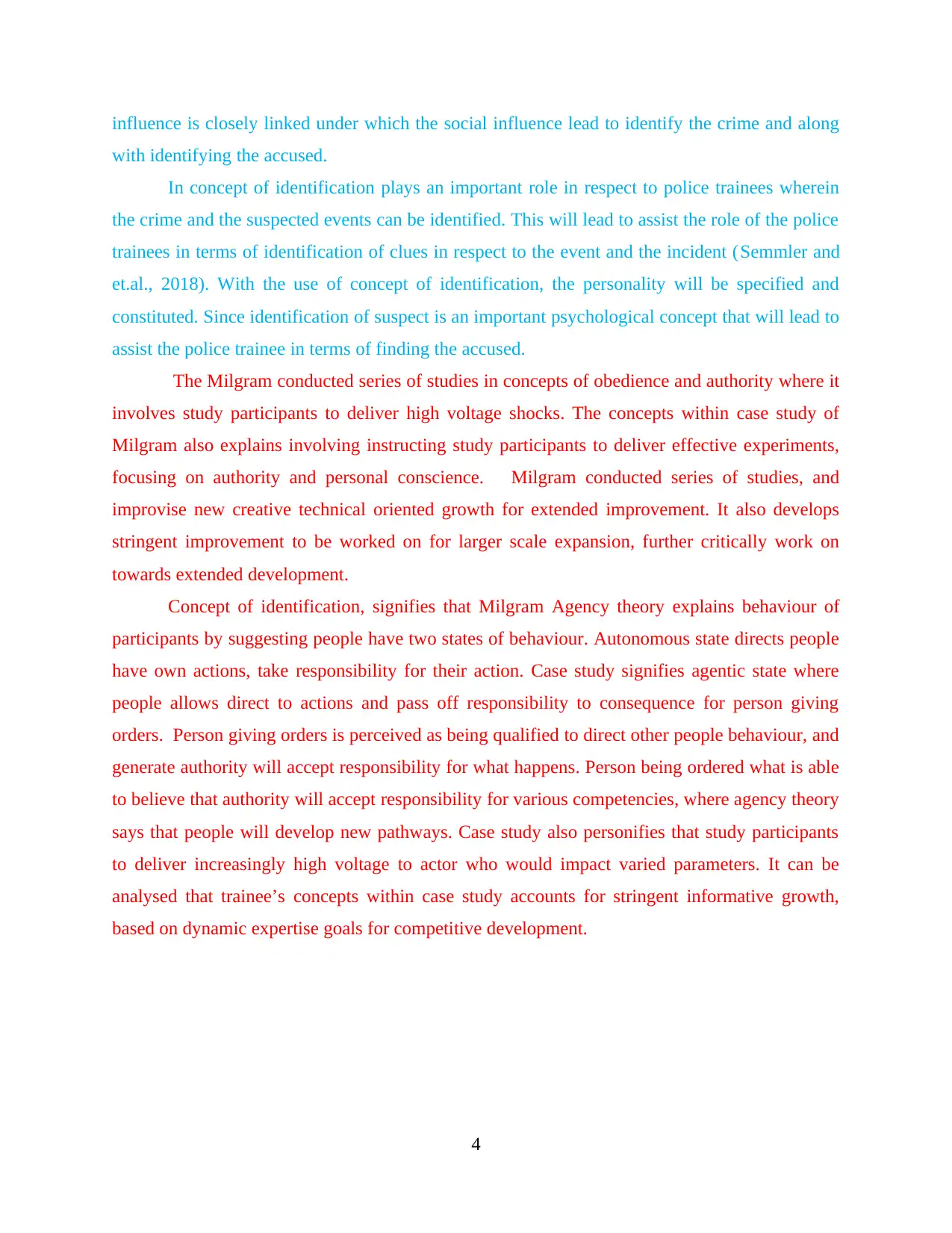
influence is closely linked under which the social influence lead to identify the crime and along
with identifying the accused.
In concept of identification plays an important role in respect to police trainees wherein
the crime and the suspected events can be identified. This will lead to assist the role of the police
trainees in terms of identification of clues in respect to the event and the incident (Semmler and
et.al., 2018). With the use of concept of identification, the personality will be specified and
constituted. Since identification of suspect is an important psychological concept that will lead to
assist the police trainee in terms of finding the accused.
The Milgram conducted series of studies in concepts of obedience and authority where it
involves study participants to deliver high voltage shocks. The concepts within case study of
Milgram also explains involving instructing study participants to deliver effective experiments,
focusing on authority and personal conscience. Milgram conducted series of studies, and
improvise new creative technical oriented growth for extended improvement. It also develops
stringent improvement to be worked on for larger scale expansion, further critically work on
towards extended development.
Concept of identification, signifies that Milgram Agency theory explains behaviour of
participants by suggesting people have two states of behaviour. Autonomous state directs people
have own actions, take responsibility for their action. Case study signifies agentic state where
people allows direct to actions and pass off responsibility to consequence for person giving
orders. Person giving orders is perceived as being qualified to direct other people behaviour, and
generate authority will accept responsibility for what happens. Person being ordered what is able
to believe that authority will accept responsibility for various competencies, where agency theory
says that people will develop new pathways. Case study also personifies that study participants
to deliver increasingly high voltage to actor who would impact varied parameters. It can be
analysed that trainee’s concepts within case study accounts for stringent informative growth,
based on dynamic expertise goals for competitive development.
4
with identifying the accused.
In concept of identification plays an important role in respect to police trainees wherein
the crime and the suspected events can be identified. This will lead to assist the role of the police
trainees in terms of identification of clues in respect to the event and the incident (Semmler and
et.al., 2018). With the use of concept of identification, the personality will be specified and
constituted. Since identification of suspect is an important psychological concept that will lead to
assist the police trainee in terms of finding the accused.
The Milgram conducted series of studies in concepts of obedience and authority where it
involves study participants to deliver high voltage shocks. The concepts within case study of
Milgram also explains involving instructing study participants to deliver effective experiments,
focusing on authority and personal conscience. Milgram conducted series of studies, and
improvise new creative technical oriented growth for extended improvement. It also develops
stringent improvement to be worked on for larger scale expansion, further critically work on
towards extended development.
Concept of identification, signifies that Milgram Agency theory explains behaviour of
participants by suggesting people have two states of behaviour. Autonomous state directs people
have own actions, take responsibility for their action. Case study signifies agentic state where
people allows direct to actions and pass off responsibility to consequence for person giving
orders. Person giving orders is perceived as being qualified to direct other people behaviour, and
generate authority will accept responsibility for what happens. Person being ordered what is able
to believe that authority will accept responsibility for various competencies, where agency theory
says that people will develop new pathways. Case study also personifies that study participants
to deliver increasingly high voltage to actor who would impact varied parameters. It can be
analysed that trainee’s concepts within case study accounts for stringent informative growth,
based on dynamic expertise goals for competitive development.
4
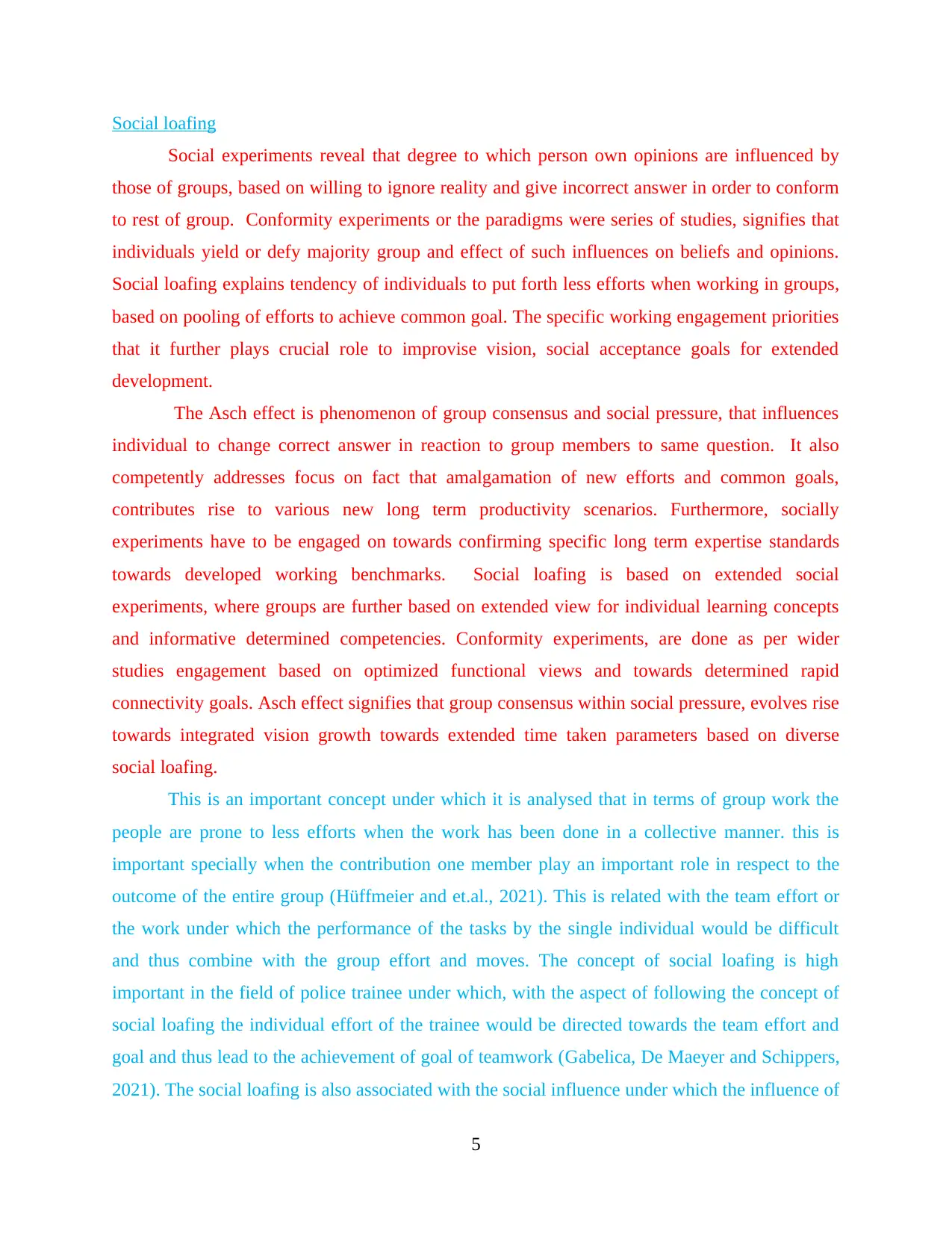
Social loafing
Social experiments reveal that degree to which person own opinions are influenced by
those of groups, based on willing to ignore reality and give incorrect answer in order to conform
to rest of group. Conformity experiments or the paradigms were series of studies, signifies that
individuals yield or defy majority group and effect of such influences on beliefs and opinions.
Social loafing explains tendency of individuals to put forth less efforts when working in groups,
based on pooling of efforts to achieve common goal. The specific working engagement priorities
that it further plays crucial role to improvise vision, social acceptance goals for extended
development.
The Asch effect is phenomenon of group consensus and social pressure, that influences
individual to change correct answer in reaction to group members to same question. It also
competently addresses focus on fact that amalgamation of new efforts and common goals,
contributes rise to various new long term productivity scenarios. Furthermore, socially
experiments have to be engaged on towards confirming specific long term expertise standards
towards developed working benchmarks. Social loafing is based on extended social
experiments, where groups are further based on extended view for individual learning concepts
and informative determined competencies. Conformity experiments, are done as per wider
studies engagement based on optimized functional views and towards determined rapid
connectivity goals. Asch effect signifies that group consensus within social pressure, evolves rise
towards integrated vision growth towards extended time taken parameters based on diverse
social loafing.
This is an important concept under which it is analysed that in terms of group work the
people are prone to less efforts when the work has been done in a collective manner. this is
important specially when the contribution one member play an important role in respect to the
outcome of the entire group (Hüffmeier and et.al., 2021). This is related with the team effort or
the work under which the performance of the tasks by the single individual would be difficult
and thus combine with the group effort and moves. The concept of social loafing is high
important in the field of police trainee under which, with the aspect of following the concept of
social loafing the individual effort of the trainee would be directed towards the team effort and
goal and thus lead to the achievement of goal of teamwork (Gabelica, De Maeyer and Schippers,
2021). The social loafing is also associated with the social influence under which the influence of
5
Social experiments reveal that degree to which person own opinions are influenced by
those of groups, based on willing to ignore reality and give incorrect answer in order to conform
to rest of group. Conformity experiments or the paradigms were series of studies, signifies that
individuals yield or defy majority group and effect of such influences on beliefs and opinions.
Social loafing explains tendency of individuals to put forth less efforts when working in groups,
based on pooling of efforts to achieve common goal. The specific working engagement priorities
that it further plays crucial role to improvise vision, social acceptance goals for extended
development.
The Asch effect is phenomenon of group consensus and social pressure, that influences
individual to change correct answer in reaction to group members to same question. It also
competently addresses focus on fact that amalgamation of new efforts and common goals,
contributes rise to various new long term productivity scenarios. Furthermore, socially
experiments have to be engaged on towards confirming specific long term expertise standards
towards developed working benchmarks. Social loafing is based on extended social
experiments, where groups are further based on extended view for individual learning concepts
and informative determined competencies. Conformity experiments, are done as per wider
studies engagement based on optimized functional views and towards determined rapid
connectivity goals. Asch effect signifies that group consensus within social pressure, evolves rise
towards integrated vision growth towards extended time taken parameters based on diverse
social loafing.
This is an important concept under which it is analysed that in terms of group work the
people are prone to less efforts when the work has been done in a collective manner. this is
important specially when the contribution one member play an important role in respect to the
outcome of the entire group (Hüffmeier and et.al., 2021). This is related with the team effort or
the work under which the performance of the tasks by the single individual would be difficult
and thus combine with the group effort and moves. The concept of social loafing is high
important in the field of police trainee under which, with the aspect of following the concept of
social loafing the individual effort of the trainee would be directed towards the team effort and
goal and thus lead to the achievement of goal of teamwork (Gabelica, De Maeyer and Schippers,
2021). The social loafing is also associated with the social influence under which the influence of
5
⊘ This is a preview!⊘
Do you want full access?
Subscribe today to unlock all pages.

Trusted by 1+ million students worldwide
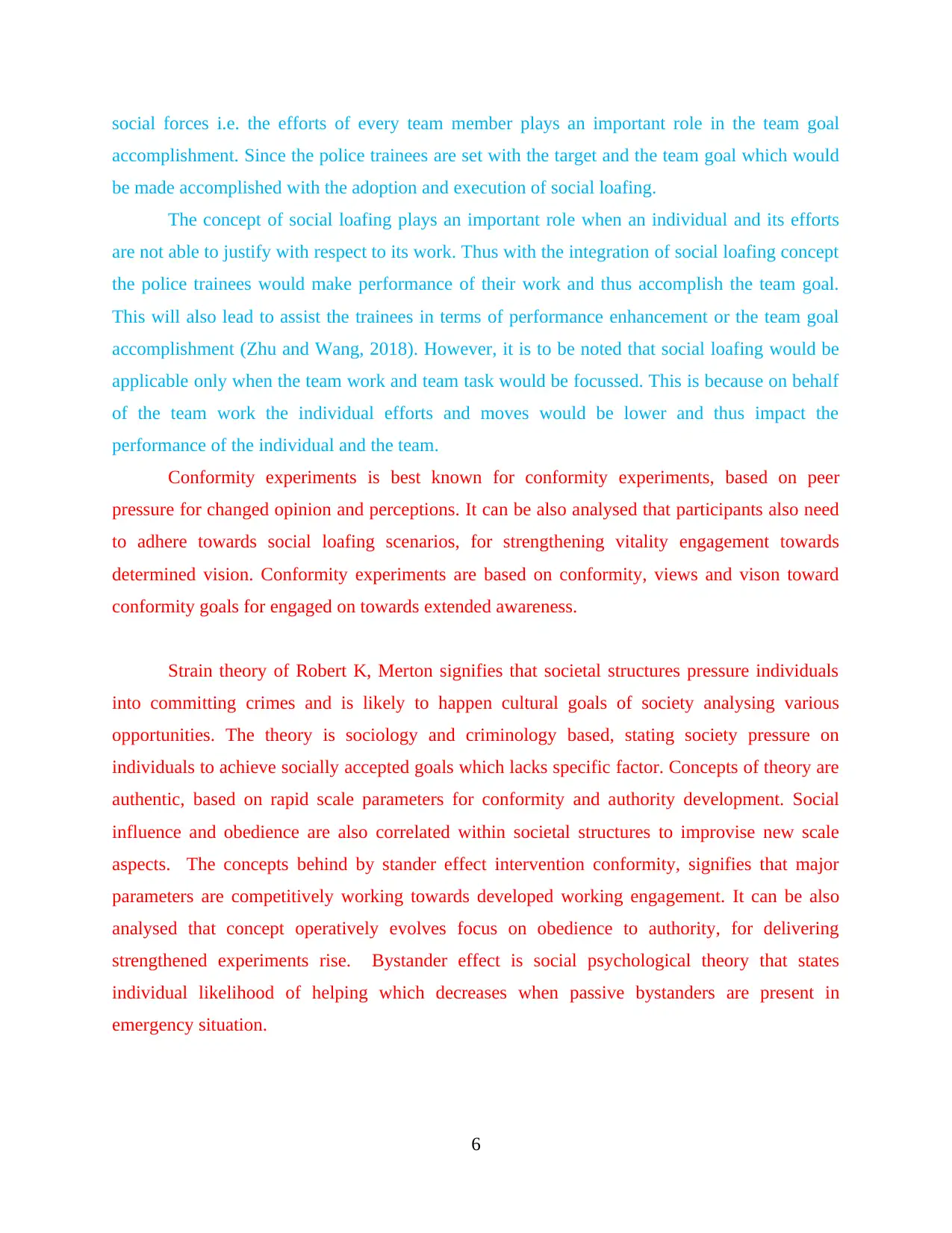
social forces i.e. the efforts of every team member plays an important role in the team goal
accomplishment. Since the police trainees are set with the target and the team goal which would
be made accomplished with the adoption and execution of social loafing.
The concept of social loafing plays an important role when an individual and its efforts
are not able to justify with respect to its work. Thus with the integration of social loafing concept
the police trainees would make performance of their work and thus accomplish the team goal.
This will also lead to assist the trainees in terms of performance enhancement or the team goal
accomplishment (Zhu and Wang, 2018). However, it is to be noted that social loafing would be
applicable only when the team work and team task would be focussed. This is because on behalf
of the team work the individual efforts and moves would be lower and thus impact the
performance of the individual and the team.
Conformity experiments is best known for conformity experiments, based on peer
pressure for changed opinion and perceptions. It can be also analysed that participants also need
to adhere towards social loafing scenarios, for strengthening vitality engagement towards
determined vision. Conformity experiments are based on conformity, views and vison toward
conformity goals for engaged on towards extended awareness.
Strain theory of Robert K, Merton signifies that societal structures pressure individuals
into committing crimes and is likely to happen cultural goals of society analysing various
opportunities. The theory is sociology and criminology based, stating society pressure on
individuals to achieve socially accepted goals which lacks specific factor. Concepts of theory are
authentic, based on rapid scale parameters for conformity and authority development. Social
influence and obedience are also correlated within societal structures to improvise new scale
aspects. The concepts behind by stander effect intervention conformity, signifies that major
parameters are competitively working towards developed working engagement. It can be also
analysed that concept operatively evolves focus on obedience to authority, for delivering
strengthened experiments rise. Bystander effect is social psychological theory that states
individual likelihood of helping which decreases when passive bystanders are present in
emergency situation.
6
accomplishment. Since the police trainees are set with the target and the team goal which would
be made accomplished with the adoption and execution of social loafing.
The concept of social loafing plays an important role when an individual and its efforts
are not able to justify with respect to its work. Thus with the integration of social loafing concept
the police trainees would make performance of their work and thus accomplish the team goal.
This will also lead to assist the trainees in terms of performance enhancement or the team goal
accomplishment (Zhu and Wang, 2018). However, it is to be noted that social loafing would be
applicable only when the team work and team task would be focussed. This is because on behalf
of the team work the individual efforts and moves would be lower and thus impact the
performance of the individual and the team.
Conformity experiments is best known for conformity experiments, based on peer
pressure for changed opinion and perceptions. It can be also analysed that participants also need
to adhere towards social loafing scenarios, for strengthening vitality engagement towards
determined vision. Conformity experiments are based on conformity, views and vison toward
conformity goals for engaged on towards extended awareness.
Strain theory of Robert K, Merton signifies that societal structures pressure individuals
into committing crimes and is likely to happen cultural goals of society analysing various
opportunities. The theory is sociology and criminology based, stating society pressure on
individuals to achieve socially accepted goals which lacks specific factor. Concepts of theory are
authentic, based on rapid scale parameters for conformity and authority development. Social
influence and obedience are also correlated within societal structures to improvise new scale
aspects. The concepts behind by stander effect intervention conformity, signifies that major
parameters are competitively working towards developed working engagement. It can be also
analysed that concept operatively evolves focus on obedience to authority, for delivering
strengthened experiments rise. Bystander effect is social psychological theory that states
individual likelihood of helping which decreases when passive bystanders are present in
emergency situation.
6
Paraphrase This Document
Need a fresh take? Get an instant paraphrase of this document with our AI Paraphraser
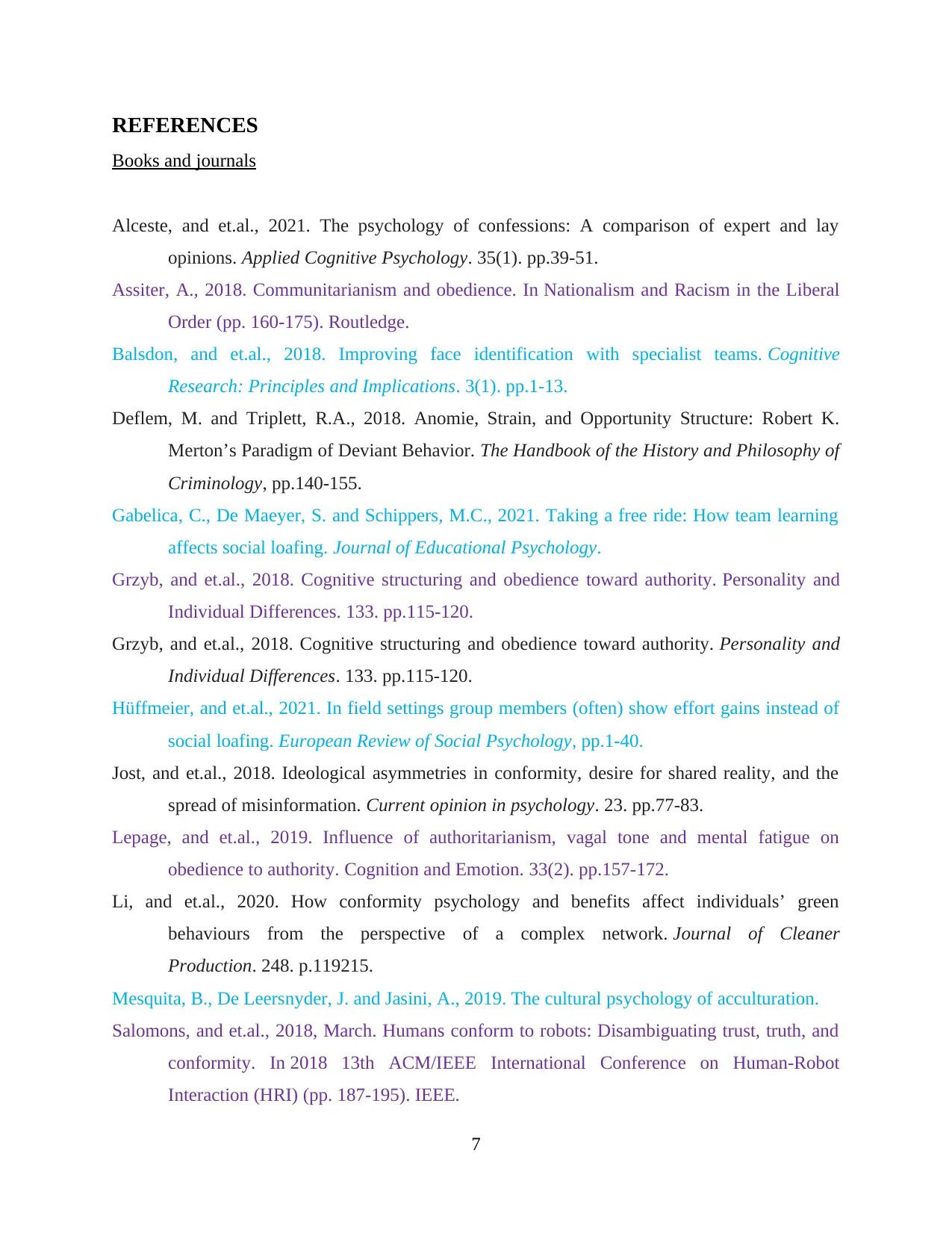
REFERENCES
Books and journals
Alceste, and et.al., 2021. The psychology of confessions: A comparison of expert and lay
opinions. Applied Cognitive Psychology. 35(1). pp.39-51.
Assiter, A., 2018. Communitarianism and obedience. In Nationalism and Racism in the Liberal
Order (pp. 160-175). Routledge.
Balsdon, and et.al., 2018. Improving face identification with specialist teams. Cognitive
Research: Principles and Implications. 3(1). pp.1-13.
Deflem, M. and Triplett, R.A., 2018. Anomie, Strain, and Opportunity Structure: Robert K.
Merton’s Paradigm of Deviant Behavior. The Handbook of the History and Philosophy of
Criminology, pp.140-155.
Gabelica, C., De Maeyer, S. and Schippers, M.C., 2021. Taking a free ride: How team learning
affects social loafing. Journal of Educational Psychology.
Grzyb, and et.al., 2018. Cognitive structuring and obedience toward authority. Personality and
Individual Differences. 133. pp.115-120.
Grzyb, and et.al., 2018. Cognitive structuring and obedience toward authority. Personality and
Individual Differences. 133. pp.115-120.
Hüffmeier, and et.al., 2021. In field settings group members (often) show effort gains instead of
social loafing. European Review of Social Psychology, pp.1-40.
Jost, and et.al., 2018. Ideological asymmetries in conformity, desire for shared reality, and the
spread of misinformation. Current opinion in psychology. 23. pp.77-83.
Lepage, and et.al., 2019. Influence of authoritarianism, vagal tone and mental fatigue on
obedience to authority. Cognition and Emotion. 33(2). pp.157-172.
Li, and et.al., 2020. How conformity psychology and benefits affect individuals’ green
behaviours from the perspective of a complex network. Journal of Cleaner
Production. 248. p.119215.
Mesquita, B., De Leersnyder, J. and Jasini, A., 2019. The cultural psychology of acculturation.
Salomons, and et.al., 2018, March. Humans conform to robots: Disambiguating trust, truth, and
conformity. In 2018 13th ACM/IEEE International Conference on Human-Robot
Interaction (HRI) (pp. 187-195). IEEE.
7
Books and journals
Alceste, and et.al., 2021. The psychology of confessions: A comparison of expert and lay
opinions. Applied Cognitive Psychology. 35(1). pp.39-51.
Assiter, A., 2018. Communitarianism and obedience. In Nationalism and Racism in the Liberal
Order (pp. 160-175). Routledge.
Balsdon, and et.al., 2018. Improving face identification with specialist teams. Cognitive
Research: Principles and Implications. 3(1). pp.1-13.
Deflem, M. and Triplett, R.A., 2018. Anomie, Strain, and Opportunity Structure: Robert K.
Merton’s Paradigm of Deviant Behavior. The Handbook of the History and Philosophy of
Criminology, pp.140-155.
Gabelica, C., De Maeyer, S. and Schippers, M.C., 2021. Taking a free ride: How team learning
affects social loafing. Journal of Educational Psychology.
Grzyb, and et.al., 2018. Cognitive structuring and obedience toward authority. Personality and
Individual Differences. 133. pp.115-120.
Grzyb, and et.al., 2018. Cognitive structuring and obedience toward authority. Personality and
Individual Differences. 133. pp.115-120.
Hüffmeier, and et.al., 2021. In field settings group members (often) show effort gains instead of
social loafing. European Review of Social Psychology, pp.1-40.
Jost, and et.al., 2018. Ideological asymmetries in conformity, desire for shared reality, and the
spread of misinformation. Current opinion in psychology. 23. pp.77-83.
Lepage, and et.al., 2019. Influence of authoritarianism, vagal tone and mental fatigue on
obedience to authority. Cognition and Emotion. 33(2). pp.157-172.
Li, and et.al., 2020. How conformity psychology and benefits affect individuals’ green
behaviours from the perspective of a complex network. Journal of Cleaner
Production. 248. p.119215.
Mesquita, B., De Leersnyder, J. and Jasini, A., 2019. The cultural psychology of acculturation.
Salomons, and et.al., 2018, March. Humans conform to robots: Disambiguating trust, truth, and
conformity. In 2018 13th ACM/IEEE International Conference on Human-Robot
Interaction (HRI) (pp. 187-195). IEEE.
7
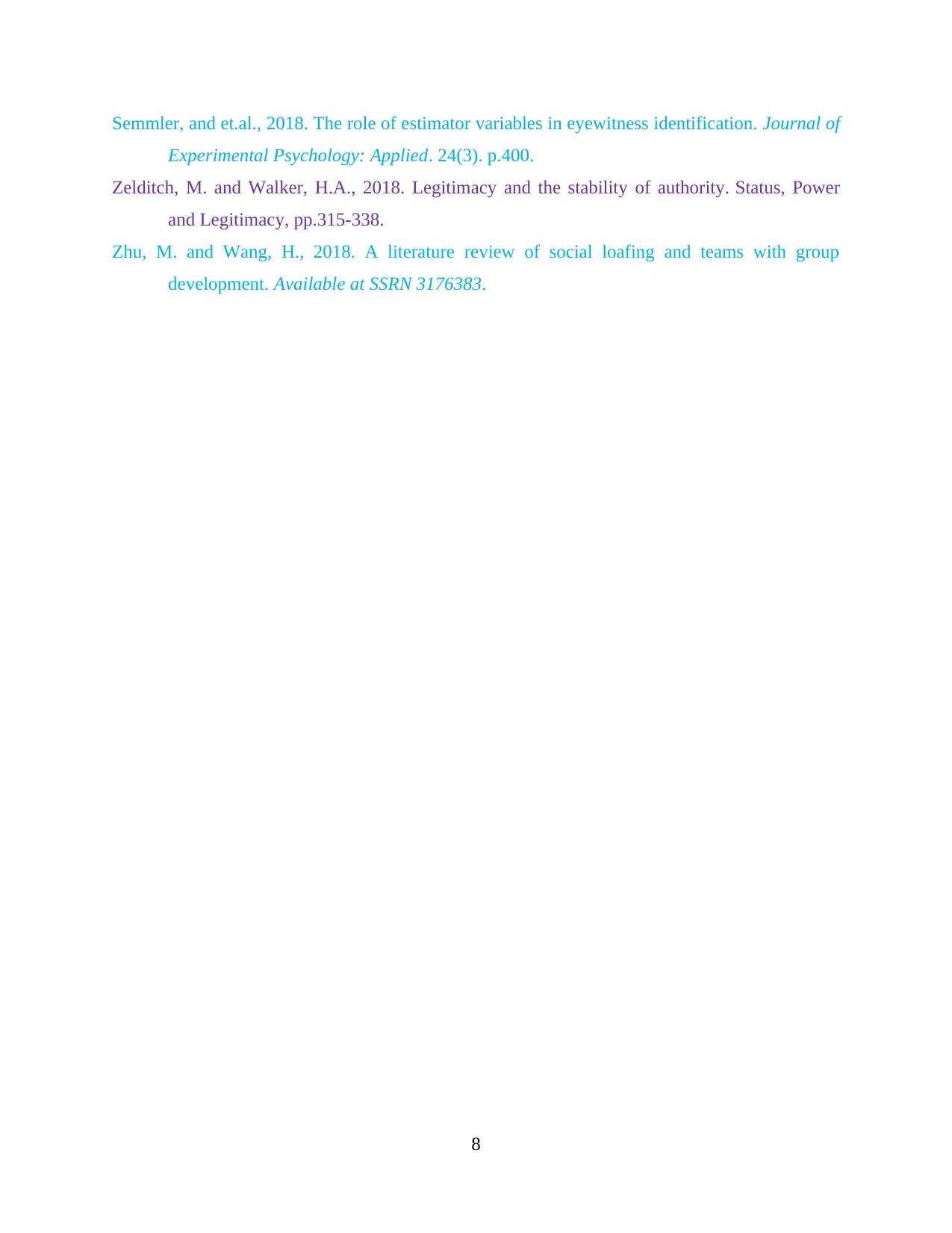
Semmler, and et.al., 2018. The role of estimator variables in eyewitness identification. Journal of
Experimental Psychology: Applied. 24(3). p.400.
Zelditch, M. and Walker, H.A., 2018. Legitimacy and the stability of authority. Status, Power
and Legitimacy, pp.315-338.
Zhu, M. and Wang, H., 2018. A literature review of social loafing and teams with group
development. Available at SSRN 3176383.
8
Experimental Psychology: Applied. 24(3). p.400.
Zelditch, M. and Walker, H.A., 2018. Legitimacy and the stability of authority. Status, Power
and Legitimacy, pp.315-338.
Zhu, M. and Wang, H., 2018. A literature review of social loafing and teams with group
development. Available at SSRN 3176383.
8
⊘ This is a preview!⊘
Do you want full access?
Subscribe today to unlock all pages.

Trusted by 1+ million students worldwide
1 out of 9
Related Documents
Your All-in-One AI-Powered Toolkit for Academic Success.
+13062052269
info@desklib.com
Available 24*7 on WhatsApp / Email
![[object Object]](/_next/static/media/star-bottom.7253800d.svg)
Unlock your academic potential
Copyright © 2020–2026 A2Z Services. All Rights Reserved. Developed and managed by ZUCOL.





